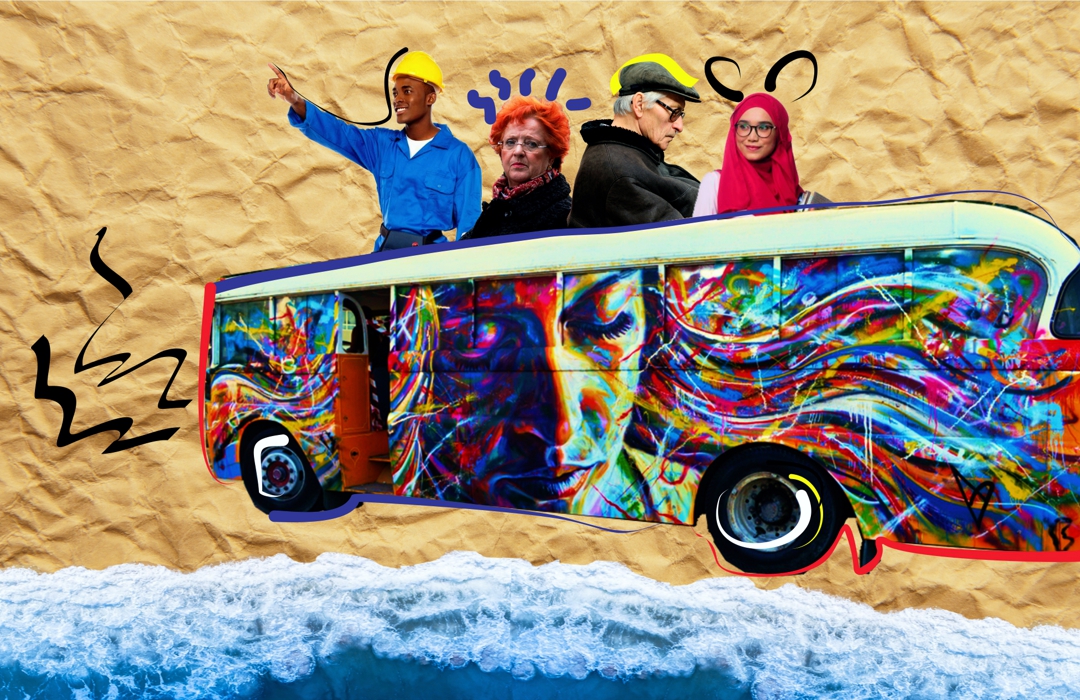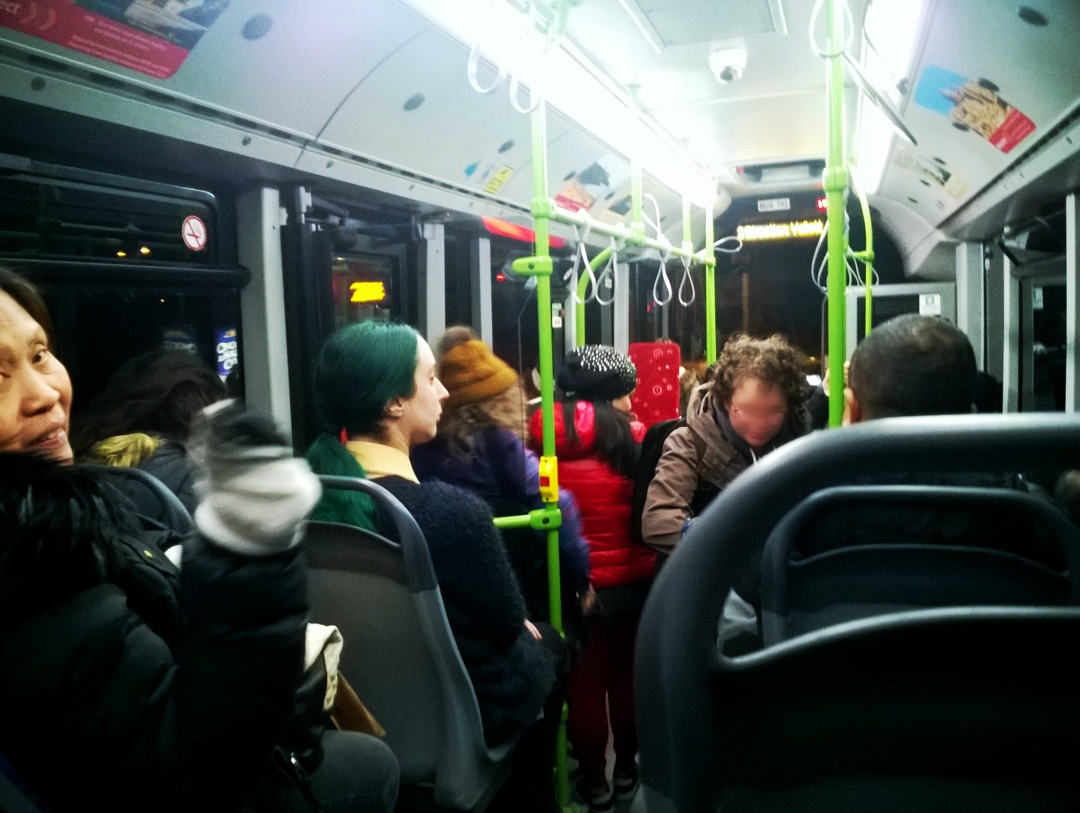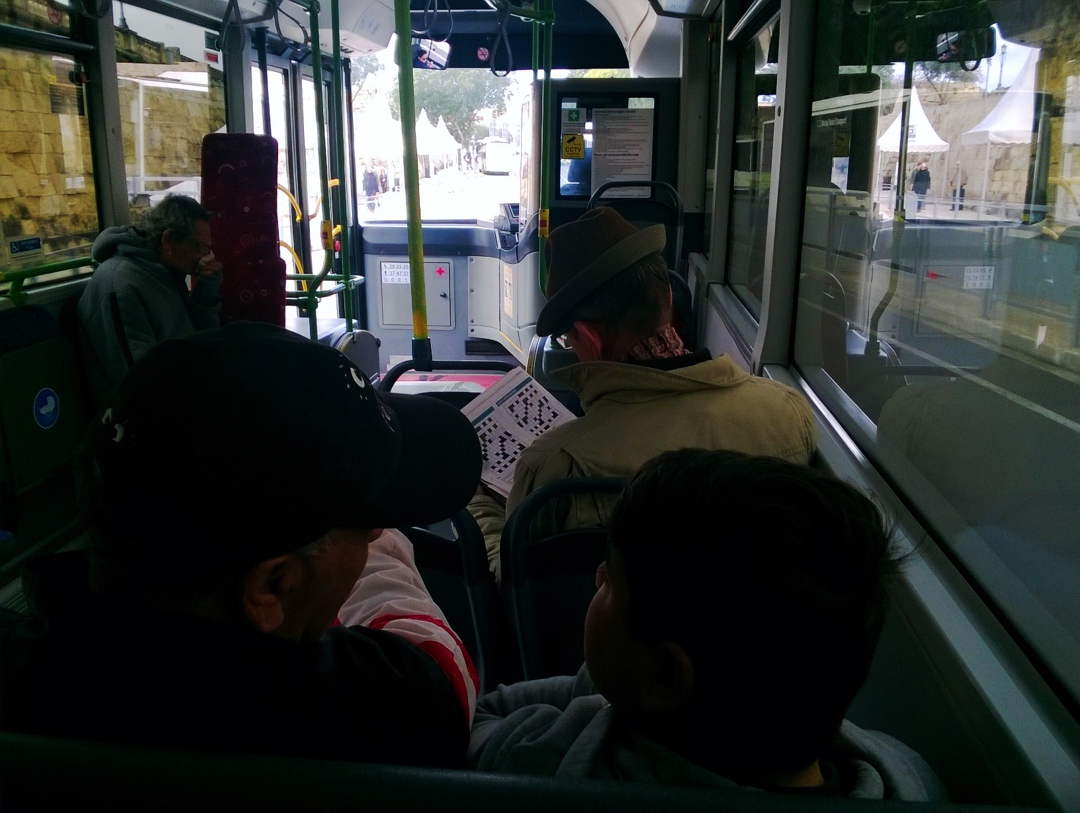
Bus trips are a special opportunity to break away from carefully curated, air-tight social circles where many individuals willingly lock themselves up. Whether they like it or not, the bus is the space where each passenger has to face the stereotypical ‘other’.
by Raisa Galea
Collage by the author
[dropcap]Y[/dropcap]es, you’ve read it right. It might sound perplexing, but Malta’s public transport deserves most genuine praise for at least one of its features, and ever since my first bus ride in 2007, I’ve been its loyal advocate. Back then, the buses were colourful museum artefacts adorned with madonnas and rosary beads; today they are rather plain and unremarkable. International operators came and went, yet two aspects of the bus system endured, moving on from a previous operator to its successor.
Inefficiency, the negative constant, is infamous among customers of public transport and private car aficionados alike: despite plenty of debate and numerous reforms, buses are seldom on time and remain distressingly unreliable. On the other hand, the pros are even more significant, even if they are not on many lips. I believe that the experience of diversity—the ultimate positive feature of the public bus—almost absolves the system’s copious flaws.
![]()
Nowhere else in Malta, be it a village grocery store, a supermarket, a university campus, or even a nightclub, would you meet strangers from as many different walks of life in such close proximity to one another.
Every morning a bus from Valletta to Msida (the route I use most frequently) transports a mixture of people. It could almost be a microcosm of today’s demography and employment situation in Malta: students and lecturers commuting daily to university and Junior College, pensioners visiting our main hospital, tourists wayfaring along to the main local attractions as identified in touristic brochures and guide books. Caregivers, officers, service and construction workers, to name just a few, comprise the majority of passengers on early morning trips.
The bus could almost be a microcosm of today’s demography and employment situation in Malta.
Side by side, shoulder to shoulder, there are African workers and Maltese pensioners; Muslim female students wearing headscarves and irritable elderly men, Filipino caregivers and teenage college students, nodding to blaring tunes in headphones, young mothers and their curious babies. A blend of various linguistic lilts and languages fills up this can on wheels with an aura of distant places. These are the strangers with whom I share a closed space on the public bus for half an hour twice a day, five days a week.
And although we know little to nothing about each other, our lives cut across as we head to a shared destination. For a few brief moments, our differences do not matter: we are united in silent or explicit cursing of yet another clumsy car driver responsible for holding up the traffic.

Of course, public commute is not all roses, especially during rush hours.
Confrontations happen. Frustrating realities of congested roads and stressful working conditions often backfire: at times, drivers insult passengers, and the latter mistreat each other (for the record, a couple of times I ended up being nearly dragged out from the bus). In addition, practically on every trip, someone would mutter a few complaints about ‘ħafna barranin’—a disconcerting, yet too common, phrase for every Maltese-speaking foreigner to hear. No doubt, commuting would have been more pleasant without all of those, but minute confrontations might be helpful nevertheless: this way, passengers ought to acknowledge each other’s existence.
Still, kinder episodes seem to prevail. On a number of occasions, I witnessed ordinary teenage boys offering seats to elderly Muslim women and African workers helping Maltese passengers with disabilities to get on and off the bus. Babies and toddlers enjoy a special status: irrespective of skin colour, they become a center of other passengers’ attention. Malta’s best known (and most controversial) talk show, Xarabank, is named after the bus for a reason: sharing daily commute with others rescues us from isolation and fosters communication—from small talk to in-depth conversation—and, thus, opens up a possibility for making new acquaintances and exchanging thoughts.
Malta’s best known (and most controversial) talk show, Xarabank, is named after the bus for a reason: sharing daily commute with others rescues us from isolation and fosters communication.
When public space is under continuous assault by commercial interests of all scales, the role of the bus as a public forum becomes even more significant. Why?
Bus trips are a special opportunity to break away from carefully curated, air-tight social circles where many individuals willingly lock themselves up. Whether they like it or not, the bus is the space where each passenger has to face the stereotypical ‘other’: persons of different ethnicity or religious beliefs whose distorted and alienating image is often circulated in the mainstream social media, but whose physical proximity could encourage everyone to challenge the narrative of social exclusion.
![]()

Although the diversity of commute companions is truly impressive and cuts through all age, gender and ethnic groups, it still is incomplete.
Suit-clad managers and hip employees of the igaming sector—in other words, passengers from a middle class background—can seldom be spotted among the predominantly working-class crowd. A decade of bus trips has taught me more about Malta’s social phenomena than all the national newspapers have ever done: the disdainful attitude of many Maltese to public transport reflects the overall low prestige of public infrastructure.
I believe that, first and foremost, it is the diversity and openness of the bus—and not its lack of timekeeping—that repels affluent Maltese from using it. How can individuals, too accustomed to the sterile environment of private schools, family firms or fashionable, ostensibly middle-class workplaces, mix with those they consider riff-raff? How can a privileged manager stay side by side with an African construction worker, whose daily job left him covered in dust and sweat?
I believe that, first and foremost, it is the diversity and openness of the bus—and not its lack of timekeeping—that repels affluent Maltese from using it.
I do not mean to diminish the importance of lobbying for a better cycling infrastructure, but it is no surprise that such initiatives gain hefty support among the Maltese middle class: cycling may be affordable, but it also is a means of personalised commuting, which spares cyclists from close encounters with strangers of a lower social standing. In a society that prioritises concerns of the affluent and overlooks the needs of everybody else, marginalising attitudes toward public transport feed a vicious cycle. Perceived as the infrastructure for disadvantaged minorities, public transport simply does not receive enough investment to improve its services.
Despite its many flaws, a bus trip is a snippet of what the rest of our society could be like, if only we were more willing to share space, interests, and, ultimately, goals. By opting for a bus ride, individuals of various social background and physical ability choose to share something with persons outside their circle of family and friends, even if it is only a short journey. Indeed, this unique experience of diversity and mutual acceptance is worth all the tens of minutes that waiting on a bus stop entail.
Leave a Reply